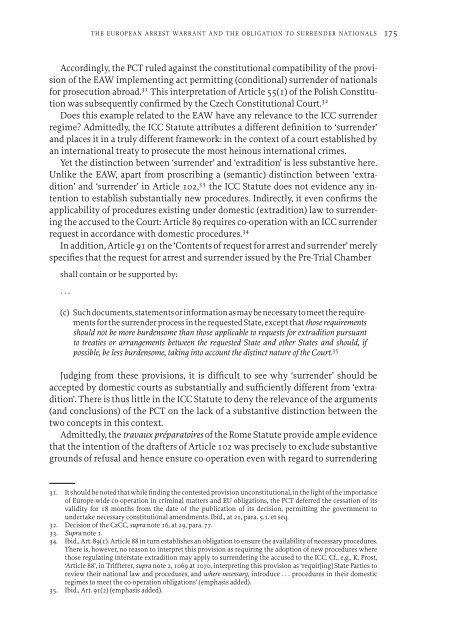Lessons of the European Arrest Warrant for Domestic ...
Lessons of the European Arrest Warrant for Domestic ...
Lessons of the European Arrest Warrant for Domestic ...
You also want an ePaper? Increase the reach of your titles
YUMPU automatically turns print PDFs into web optimized ePapers that Google loves.
THE EUROPEAN ARREST WARRANT AND THE OBLIGATION TO SURRENDER NATIONALS 175Accordingly, <strong>the</strong> PCT ruled against <strong>the</strong> constitutional compatibility <strong>of</strong> <strong>the</strong> provision<strong>of</strong> <strong>the</strong> EAW implementing act permitting (conditional) surrender <strong>of</strong> nationals<strong>for</strong> prosecution abroad. 31 This interpretation <strong>of</strong> Article 55(1) <strong>of</strong> <strong>the</strong> Polish Constitutionwas subsequently confirmed by <strong>the</strong> Czech Constitutional Court. 32Does this example related to <strong>the</strong> EAW have any relevance to <strong>the</strong> ICC surrenderregime? Admittedly, <strong>the</strong> ICC Statute attributes a different definition to ‘surrender’and places it in a truly different framework: in <strong>the</strong> context <strong>of</strong> a court established byan international treaty to prosecute <strong>the</strong> most heinous international crimes.Yet <strong>the</strong> distinction between ‘surrender’ and ‘extradition’ is less substantive here.Unlike <strong>the</strong> EAW, apart from proscribing a (semantic) distinction between ‘extradition’and ‘surrender’ in Article 102, 33 <strong>the</strong> ICC Statute does not evidence any intentionto establish substantially new procedures. Indirectly, it even confirms <strong>the</strong>applicability <strong>of</strong> procedures existing under domestic (extradition) law to surrendering<strong>the</strong> accused to <strong>the</strong> Court: Article 89 requires co-operation with an ICC surrenderrequest in accordance with domestic procedures. 34In addition, Article 91 on <strong>the</strong> ‘Contents <strong>of</strong> request <strong>for</strong> arrest and surrender’ merelyspecifies that <strong>the</strong> request <strong>for</strong> arrest and surrender issued by <strong>the</strong> Pre-Trial Chambershall contain or be supported by:...(c) Suchdocuments,statementsorin<strong>for</strong>mationasmaybenecessarytomeet<strong>the</strong>requirements<strong>for</strong> <strong>the</strong> surrender process in <strong>the</strong> requested State, except that those requirementsshould not be more burdensome than those applicable to requests <strong>for</strong> extradition pursuantto treaties or arrangements between <strong>the</strong> requested State and o<strong>the</strong>r States and should, ifpossible, be less burdensome, taking into account <strong>the</strong> distinct nature <strong>of</strong> <strong>the</strong> Court. 35Judging from <strong>the</strong>se provisions, it is difficult to see why ‘surrender’ should beaccepted by domestic courts as substantially and sufficiently different from ‘extradition’.There is thus little in <strong>the</strong> ICC Statute to deny <strong>the</strong> relevance <strong>of</strong> <strong>the</strong> arguments(and conclusions) <strong>of</strong> <strong>the</strong> PCT on <strong>the</strong> lack <strong>of</strong> a substantive distinction between <strong>the</strong>two concepts in this context.Admittedly, <strong>the</strong> travaux préparatoires <strong>of</strong> <strong>the</strong> Rome Statute provide ample evidencethat <strong>the</strong> intention <strong>of</strong> <strong>the</strong> drafters <strong>of</strong> Article 102 was precisely to exclude substantivegrounds <strong>of</strong> refusal and hence ensure co-operation even with regard to surrendering31. It should be noted that while finding <strong>the</strong> contested provision unconstitutional, in <strong>the</strong> light <strong>of</strong> <strong>the</strong> importance<strong>of</strong> Europe-wide co-operation in criminal matters and EU obligations, <strong>the</strong> PCT deferred <strong>the</strong> cessation <strong>of</strong> itsvalidity <strong>for</strong> 18 months from <strong>the</strong> date <strong>of</strong> <strong>the</strong> publication <strong>of</strong> its decision, permitting <strong>the</strong> government toundertake necessary constitutional amendments. Ibid., at 21, para. 5.1. et seq.32. Decision <strong>of</strong> <strong>the</strong> CzCC, supra note 16, at 29, para. 77.33. Supra note 1.34. Ibid., Art. 89(1). Article 88 in turn establishes an obligation to ensure <strong>the</strong> availability <strong>of</strong> necessary procedures.There is, however, no reason to interpret this provision as requiring <strong>the</strong> adoption <strong>of</strong> new procedures wherethose regulating interstate extradition may apply to surrendering <strong>the</strong> accused to <strong>the</strong> ICC. Cf., e.g., K. Prost,‘Article 88’, in Triffterer, supra note 2, 1069 at 1070, interpreting this provision as ‘requir[ing] State Parties toreview <strong>the</strong>ir national law and procedures, and where necessary, introduce...procedures in <strong>the</strong>ir domesticregimes to meet <strong>the</strong> co-operation obligations’ (emphasis added).35. Ibid., Art. 91(2) (emphasis added).
















